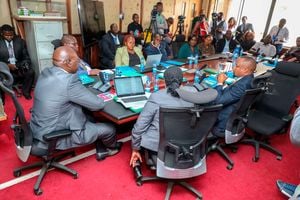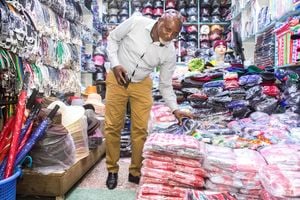
Nyamakima in Nairobi.
Nyamakima traders say negotiations with authorities to relax import regulations, particularly rigid requirements for consolidated cargo, are bearing fruit as the government confronts grievances that cost the previous Uhuru Kenyatta administration political support.
Traders said meetings this week had made significant progress, particularly on the thorny issue of cargo belonging to different people being consolidated into one shipment - a cost-saving measure favoured by small-scale importers - and a status report is expected on Thursday.
The meetings are a follow-up to the March 28 and April 10 forums with Deputy President Rigathi Gachagua, who brokered the deal for the release of 700 containers held at Mombasa port and the reduction of import duty from Sh3 million to Sh2.5 million per container.
The Nairobi Business Community has been divided into 16 trading zones that will be covered by the agreement reached after talks between the traders and the government.
The community's interim chairman, Mr Muturi Kariuki, told Nation.Africa that a comprehensive report on the milestones covered so far in the engagements with the government will be released on Thursday afternoon.
"We are putting particular emphasis on the issue of consolidation. It has become one of the hot potatoes. We have been meeting since Monday to iron it out and come up with a long-term model that will address all the concerns that have been raised," said Mr Kariuki.
Mr Kariuki, however, explained that Mr Gachagua's commitments were being met in good faith and where more consultations were needed, "we have set up about five working committees that have been meeting with relevant authorities.
"The consolidation of goods so far ordered and shipped has been allowed to run its full course but should be more stringently managed going forward in full realisation of the challenges likely to afflict it if approached haphazardly," he said.
The Nairobi Traders Electrical Wares Import Union, led by Thomas Njuguna, also said the consolidation blockade had been lifted, but with the caveat that only traders within the 16 zones would benefit.
"We have 16 zones in Nairobi. It has been agreed that the consolidation dilemma will be monitored at source and declared at the point of entry. Our own self-censorship will be key," Mr Njuguna explained.
"We have agreed not to deal with traders outside our zones. The government will only deal with registered lists, which we have to submit in advance to help with clearance when the containers arrive," Mr Njuguna added.
This, he said, "came after it was discovered that counterfeiters and smugglers were infiltrating us and using the consolidation space to pack their goods at source and mark them as transit goods to neighbouring countries to evade authentication and taxes."
In 2021, the government decreed that all goods consolidated in exporting countries must be deconsolidated at designated facilities upon importation into the country.
The Kenya Revenue Authority notified all consolidators and importers on February 8, 2021 that all consolidated cargo imported by sea and transported to Nairobi by standard gauge railway would be deconsolidated, cleared and collected by the owners at the Kenya Railways Corporation (Boma Line) Transit Shed.
Cargo destined for other parts of the country would be deconsolidated at the other designated facilities.
The directive to unbundle cargo was prompted by concerns about tax evasion and the infiltration of counterfeit goods, but the logistical nightmare that ensued became a campaign issue against the previous government, which was accused of being anti-business.
Last year, however, the taxman tightened the noose on traders by requiring them to deconsolidate their cargo at each point of entry and tax each item on value rather than a flat rate of Sh200 per kg of consolidated cargo. This new policy exacerbated cargo congestion and delays, frustrating traders and sowing fresh seeds of discontent against President Ruto's new administration.
It's the swelling discontent that prompted Mr Gachagua to call the meetings with traders, saying the President had authorised him to address their grievances, and another to review the implementation of agreed measures was to be held on April 14.
This last meeting did not take place, but traders reported that most of the agreed concessions had been met.
Anne Nyokabi, organising secretary of the Importers and Small Traders Association, said there had been several boardroom meetings with relevant institutions and the government had shown commitment to address all contentious issues raised.
"We are also happy that the shilling has found its strength against the dollar, thereby reducing the cost of import purchases, taxes and giving us elasticity in returns on investments," Ms Nyokabi said.
She added that multi-trade consolidation of different import goods in a single container has been allowed.
The method involves combining small consignments into one large container for delivery to the same final destination. The traders import general merchandise, including electronics, clothing, spare parts, textiles, stationery and toys, and operate within Nairobi. Among the concessions Mr Gachagua made to the traders was the release of 700 containers from the port of Mombasa that had been held for standard verification.
He also announced the reversal of a clause in the 2023 Finance Bill that increased the import duty from Sh2.5 million to Sh3 million per container - a matter that can only be reversed by a new 2024 Finance Bill to be tabled in Parliament in July. Mr Gachagua also announced the consolidation of clearance certificates from the Anti-Counterfeiting Authority and the Kenya Bureau of Standards to one instead of two.
The Nyamakima traders' crusade helped, in part, frame the Hustler Nation movement that catapulted President Ruto to power in the August 2022 polls.
His predecessor, Uhuru, had infuriated traders in 2018 after launching a war on fake imports that saw traders lose huge consignments to government-led destruction after they were deemed substandard.
"The government will vet, register and gazette all import and export cargo consolidators to root out tax evaders. I am also directing the Kenya Revenue Authority to vet all consolidators in the depots and gazette their names so that we can ensure honest business," then President Uhuru said on 27 May 2019 when he visited the Nairobi Inland Container Depot (ICD) twice - morning and evening.
Mr Kenyatta said the move was aimed at catching those who had been marking cargo meant for Kenya as destined for Uganda or South Sudan to evade taxes.
In turn, the traders, who had all along defended the Kenyatta government to the point of threatening the opposition with violence, rebelled and backed Ruto's bid for the presidency after he promised to lift the import restrictions.
Ruto and his United Democratic Alliance (UDA) brigade used the discontent to sweet-talk the traders into supporting his candidacy, promising salvation.
Being the good political brokers that they are, the traders have all along reminded the Ruto government of its promises of leniency and have so far threatened to stage street protests on three occasions. In a masterstroke that gave the Ruto government its Damascus moment over their plight, the traders organised a prayer meeting on March 16 this year and invited opposition leaders.
The invitations, sent to politicians allied to the Azimio la Umoja One Kenya Coalition Party and a perceived splinter group said to be battling the DP for political supremacy in Mt Kenya, caused unease in some quarters.
"It was a shock to the government and there were consultations left, right and centre on how to deal with the crisis. We in the Mt Kenya region were detailed to monitor the situation and make some compromises with the traders. They left us little choice, especially when they made it clear that they were ready to transfer their support to other formations," Murang'a Senator Joe Nyutu said.
He said the traders complained that "just like in the Kenyatta administration, their goods are being held at the ICD with threats of destruction".
Mr Nyutu said the traders framed their case in a similar version to the Kenyatta moment, asking the government whether it needed their support or not in the 2027 political journey.
He noted that the traders sent invitations to Kiharu MP Ndindi Nyoro and Wiper party leader Kalonzo Musyoka. Mr Musyoka was accompanied by former Kakamega governor Wycliffe Oparanya and ODM secretary general Edwin Sifuna, Mr Nyutu noted.
This arrangement was hard for the Ruto administration's fixers not to notice and they advised Mr Nyoro to attend the meeting and speak as President Ruto's representative.
At the meeting, Mr Nyoro announced that "I have been mandated to act as your bridge to the presidency, a task I offer myself fully".
"We are the hustlers who brought this government to power. We do not expect it to abandon us. This government is our friend," said David Njoroge, the traders' chairman. Ms Nyokabi said the government was overtaxing them and allowing foreigners to take over local markets.
"We're pawning our land and its opportunities. We are surreptitiously engaging in slave trade through corruption. We are selling our birthright. Laws on citizenship, work permits and residency need to be reviewed. All our opportunities are now being taken by foreigners," she said.
As the debate rages, High Court advocate Timothy Kariuki says: "The more we need to promote trade, the more we need to do so with the utmost care so as not to give any preferential treatment in a liberalised global economy and also not to compromise on consumer rights.
Mr Kariuki said Kenya, which is estimated to lose over Sh200 billion annually to the proliferation of counterfeit goods, must be very cautious about some of the import compromises.
"We can actually do more damage to the economy by recklessly pursuing political correctness. Article 46 of the Constitution, which defines consumer rights, seeks access to goods and services of reasonable quality, protection of their health, safety and economic interests and compensation for loss or injury caused by defects in goods or services," he says.
He argues that the Nyamakima dilemma should be overseen by the relevant laws, but not at the whim of political discretion. Mr Kariuki says the issues need to be scrutinised under the Competition Act to protect consumers from unfair and misleading market conduct.
"This Act promotes and protects competition in the national economy through the Competition Authority and the Competition Tribunal. The Competition Authority has broad powers to enforce consumer protection measures and to sanction businesses that contravene the provisions of this Act. It is from the recommendations of this authority that we should address these imports," he says.








